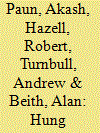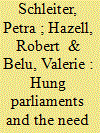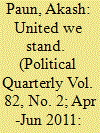| Srl | Item |
| 1 |
ID:
096259


|
|
|
|
|
| Publication |
2010.
|
| Summary/Abstract |
The return of a hung parliament at the 2010 general election is a serious possibility. But due to Westminster's limited recent experience of parliaments under 'no overall control' there is little institutional memory in Whitehall or Westminster, and even less public understanding, of what the implications would be. This article sets out to analyse the principal challenges that would be faced by government, opposition, parliament and the media in the event of a hung parliament. Drawing on experience from Canada, New Zealand and Scotland, we discuss the difficulties that may arise during the immediate government formation process and in the course of making minority or multiparty governance work on an ongoing basis. We conclude that a hung parliament need not undermine political stability or effective governance, but that all actors would need to adapt their behaviour and should therefore prepare carefully for this eventuality.
|
|
|
|
|
|
|
|
|
|
|
|
|
|
|
|
| 2 |
ID:
155410


|
|
|
|
|
| Summary/Abstract |
The general elections of 2017 and 2010 produced hung parliaments in which no single party could command an overall majority; in May 2015 the UK only narrowly avoided that outcome. When a parliament is hung, more than one potential government can be viable, and the constitutional rules that determine who has the first right to form the government can thus have a decisive influence on which government forms. In the past, the UK has applied several potentially contradictory rules (based on conventions and principles), which do not all follow an equally democratic logic. This status quo is problematic because it can generate political controversy and uncertainty, in addition to jeopardising the Monarch's role in the government formation process. A reform that enables parliament to elect the leader who will be tasked with the formation of the next government would resolve these problems and provide constitutional clarity.
|
|
|
|
|
|
|
|
|
|
|
|
|
|
|
|
| 3 |
ID:
105870


|
|
|
|
|
| Publication |
2011.
|
| Summary/Abstract |
Coalition government is an unfamiliar experience for Whitehall and Westminster. All actors are still adapting to the rules of this new political game. A number of governance challenges confront the United Kingdom's Conservative-Liberal Democrat coalition. It must strike a balance between the visions of two distinct parties and blend these into a coherent strategy for government. Like any government, it will expect to resolve most differences internally and then to show a united face to the world. Effective consultation and dispute-resolution processes within the executive will therefore be at a premium. But the separate political identities of the two parties also need to be preserved, and sufficient resources must be provided to each side within the government to enable this to happen. This article assesses the response of the coalition to these challenges in its first six months and draws lessons from relevant international experience.
|
|
|
|
|
|
|
|
|
|
|
|
|
|
|
|